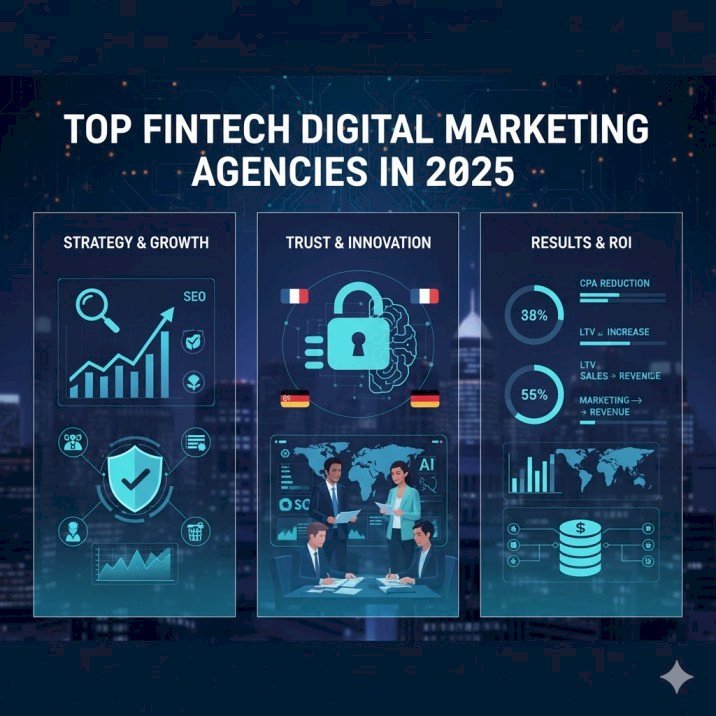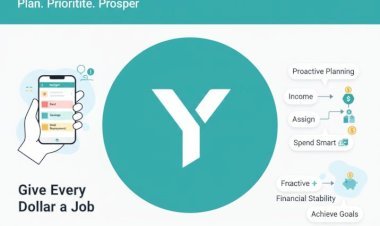Top Fintech Digital Marketing Agencies in 2025
Looking for a fintech digital marketing agency? This verified guide explains how agencies support compliant growth, build trust, and drive measurable revenue in 2025.

A fintech digital marketing agency helps financial-technology brands grow by combining compliant messaging, measurable acquisition strategies, and trust-focused communication. These agencies clarify complex financial products, ensure campaigns meet financial advertising rules, and connect marketing performance directly to customer adoption and revenue outcomes.
Fintech companies work in a highly competitive and regulated environment, where success depends on clarity and trust. Consumers and business buyers want to understand how a financial product works and whether it is secure and compliant. Fintech-focused digital marketing agencies support this process by translating product value into simple, credible messaging while also aligning campaigns with legal requirements. Their strategic role is to drive growth without compromising compliance or customer confidence.
Fintech’s Marketing Challenge
Fintech companies build digital-banking platforms, payment solutions, lending tools, and investment systems that must satisfy regulatory bodies and user expectations. Marketing these products is not only about visibility; it requires demonstrating reliability, privacy safeguards, licensing, and long-term stability.
Traditional marketing approaches often emphasize impressions or clicks, but fintech buyers evaluate credibility first. This means messaging must be precise, legally sound, and backed by transparent proof of security and performance.
What a Fintech Digital Marketing Agency Does
Fintech marketing agencies operate at the intersection of technology, regulation, and customer education. Their services typically include:
-
Search engine optimization and organic demand generation
-
Paid advertising strategy and performance management
-
Content creation and thought leadership development
-
Conversion-rate optimization and user journey improvement
-
Influencer or community management for crypto/Web3 projects
-
Revenue Operations (RevOps) integration to map marketing to revenue
Unlike general marketing firms, these agencies ensure every campaign aligns with financial advertising standards and industry guidelines.
Why Compliance and Trust Come First
In finance, accuracy is essential. One misleading statement can create legal issues or damage brand credibility. For that reason, fintech marketing teams collaborate closely with compliance and legal departments to verify campaign messaging and customer communication.
Trust also relies on education. Many fintech products change how people handle money. Customers need clear explanations, transparent security assurances, and guidance that helps them feel confident using the product. Educational resources such as product walkthroughs, how-to guides, webinars, and whitepapers are central to fintech marketing success.
Measuring What Matters
Fintech stakeholders expect marketing efforts to translate directly into measurable business results. Modern agencies integrate analytics with CRM platforms such as HubSpot or Salesforce to monitor:
-
Cost per acquisition
-
Lead quality and progression through the sales pipeline
-
Revenue impact and customer lifetime value
-
User engagement and retention metrics
Instead of focusing on surface-level statistics, the goal is to prove how marketing contributes to actual growth.
Global Agencies Active in Fintech
The following agencies are publicly recognized for working with fintech and financial-services clients, based on information available from agency websites and industry directories as of early 2025. Companies should verify current case studies and service offerings before engagement.
-
Powered by Search – Known for SEO and demand-generation programs for SaaS and fintech.
-
Siege Media – Specializes in research-driven content and SEO authority building.
-
Beacon Digital – Focuses on enterprise-level demand generation and compliance-aware messaging.
-
NoGood – Offers performance marketing with iterative experimentation and channel testing.
-
Workshop Digital – Provides data-centric paid search management and conversion optimization.
-
NinjaPromo – Works extensively with Web3, crypto, and decentralized-finance community campaigns.
Each firm emphasizes measurable growth while accounting for regulatory requirements.
How to Choose a Fintech Marketing Partner
When selecting an agency, evaluate the following:
-
Proven sector experience with regulated financial products
-
Transparency in reporting, including access to performance data
-
Alignment with revenue goals, not just traffic numbers
-
Scalability across regions if your product serves multiple markets
-
Collaborative approach that fits how your internal teams operate
The right partner should understand both technology and compliance, not just creative execution.
Industry Trends Defining 2024–2025
-
Growth of First-Party Data
Privacy regulations are shifting brands toward consent-based data collection and secure storage. -
Responsible Use of Artificial Intelligence
AI supports audience segmentation and testing, but human oversight remains necessary for compliance accuracy. -
Depth of Educational Content
Long-form, evidence-based content continues to outperform promotional short-form material. -
Localization for Global Adoption
Messaging must be adapted to cultural expectations and regional financial guidelines. -
Revenue Attribution and Unified Measurement
Marketing, sales, and customer data integration is now standard for growth analysis.
Future Outlook
Fintech marketing will continue to become more data-driven, compliance-aware, and integrated across teams. Agencies are expanding capabilities in analytics, automation, and regulatory knowledge to support complex product categories. At the same time, customer expectations for simple, secure digital-finance experiences will continue to rise, making clarity and trust the foundation of all communication.
Conclusion
Fintech success depends not only on product innovation but on how well that innovation is communicated. Specialized fintech digital marketing agencies play a key role in building credibility, educating customers, and driving measurable growth. When choosing a partner, organizations should prioritize compliance knowledge, transparency, and strategic alignment to support sustainable market adoption.
FAQs
1. What does a fintech digital marketing agency do?
A fintech digital marketing agency helps financial-technology companies grow by creating compliant marketing campaigns, building customer trust, and connecting marketing activities to measurable revenue outcomes. They focus on clear messaging, secure product explanation, and user education.
2. Why is compliance important in fintech marketing?
Fintech products are regulated, and incorrect or misleading statements can result in fines or reputational damage. Compliance ensures that marketing content accurately represents product features, data privacy practices, and financial risks, which protects both the company and customers.
3. How do fintech companies measure marketing success?
Instead of focusing only on clicks or impressions, fintech companies track metrics like cost per acquisition (CPA), conversion rates, pipeline value, customer lifetime value (LTV), and retention. These metrics show how marketing contributes to real revenue.
4. What should I look for when choosing a fintech digital marketing agency?
Look for experience with financial products, knowledge of regulatory guidelines, transparent reporting, proven growth strategies, and the ability to align marketing outputs with your revenue goals. Agencies with RevOps or CRM integration expertise are often stronger partners.
5. Do fintech agencies work globally?
Many fintech agencies do operate across multiple regions, but effective global campaigns require localized messaging and awareness of regional financial regulations. Companies should confirm whether the agency manages multilingual content and compliance variations before signing.
6. What type of content performs best for fintech companies?
Educational content tends to perform best. Examples include product explainers, how-to guides, industry research, case studies, comparison pages, and security transparency statements. This type of content builds confidence and helps users understand how the product works.
7. How does marketing differ for crypto and Web3 fintech platforms?
Crypto and Web3 companies often require community-driven marketing, transparent communication about platform mechanics, and risk disclosures. Engagement happens more through social channels, communities, and influencers rather than traditional paid campaigns.
8. Can a fintech startup benefit from hiring a marketing agency early?
Yes, if the agency focuses on clear value messaging, customer education, and scalable acquisition channels. Early alignment reduces the risk of wasted spend and helps validate product-market fit faster. However, startups should choose lean, flexible growth strategies at first.

 AnniWeston
AnniWeston 















